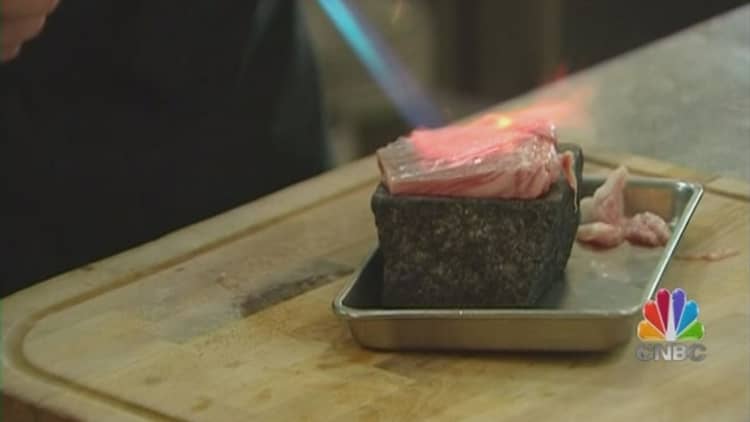
With sky-high commercial rents and a peckish consumer base with no dearth of alternatives, thriving in Singapore's competitive food and beverage (F&B) industry is tough; it takes anywhere between 18 months to three years for new entrants to break even, according to one industry boss.
But Edina Hong, one half of the dynamic duo at the Emmanuel Stroobant Group, said that by staying lean in a sector with wafer-thin margins, it was possible to succeed. With her husband, award-winning chef Emmanuel Stroobant, Hong oversees operations at the eight mid-market restaurants owned by the group in the city-state.
"We are pretty lean," Hong told CNBC's "Managing Asia."
"Off the top of my head, [we make] somewhere between 10 to 12 million [Singapore dollars] ($7 million - $8.4 million) in revenue a year."
The profit margin is about 10 percent. "It is unfortunate," Hong said, "that F&B is not one of those industries [where] you have fantastic percentages in terms of profitability."
Of the chain of restaurants Hong and Stroobant own, the stand-out is Saint Pierre, which offers French fare at the luxury residential enclave Sentosa Cove in the eastern part of Sentosa - an island resort off the Singapore mainland that is popular among tourists.
The restaurant was initially a fine dining haunt but since relocating from Central Mall on Magazine Road to Sentosa it has leaned towards casual dining, in response to the local customer base.
Stroobant said he put great emphasis on creating an authentic dining experience with the right ambiance. That, he said, could only be achieved by having the right mix of people in the business who understood his expectations for each of his restaurants.
But finding those people, Hong noted, was not easy.
"It's really, really hard to train people because you have to feel for your job," she said. "It is something that is instinctive and intuitive."
The pair have an unusual business model, in which stakeholders, or "managing partners," are brought in to manage day-to-day operations at all eight locations.
Hong said the concept had worked out so far because a managing partner both understands the urgency and has the authority to fix problems at each restaurant.
Which is important because, Hong said, "sorry" was seen a bad word in F&B, an industry where customers expect businesses to get things right.
Hong and Stroobant have been married for 17 years and business partners in Singapore for 16, which the chef said gave them a level of trust unusual in a business relationship.
"Very often, when you are in business with someone, it is strictly about money and there will be no depth in the relationship. We are the other way around...the business came after," he said.
Belgium-born Stroobant, 48, made his first foray into the culinary world as a 16-year-old dishwasher at one of his home country's best restaurants. He later trained in several Michelin-starred restaurants and at 23, he opened his first restaurant in Liege, Belgium.
His culinary journey took him around the world, from the United States to Australia; he met Hong in Malaysia and the pair moved to Singapore at the turn of the century to start their business venture.
Given the tough, competitive nature of the F&B industry, Hong said the duo run the business with a conservative mindframe and spent only within their means.
"We do not take loans. We spend what is in the bank and if there is no money in the bank, then we don't spend," she said.
The biggest sticking point for the business, Hong said, was the steep cost of renting premises in Singapore.

"If the location is great, and the rental is sky high, it does not matter," she said. "You do not open a business to lose money, you open a business to make money...[so if] the rental is not right, you just walk away."
A case in point was Brussels Sprouts, a chain of family-friendly restaurants.
While the pair broke even on the first outlet at Robertson Quay within the first three months of opening, they shut down a subsequent outlet because the rent kept multiplying.
"We started with the rental being reasonable and acceptable," said Stroobant, "Then in a couple of years, [it] doubled and then tripled. It did not make any more sense [to keep the restaurant going]."
With decades of experiences under his belt, Stroobant said eventually he wants to move from "cooking physically behind the stove 16 hours a day" to consulting or teaching in the culinary field. Hong, on the other hand, wants to grow their business bigger.
"Whether I will be able to achieve that, who knows? But we can try, we will always try, I will try," she said.
"And I will follow," added Stroobant.



